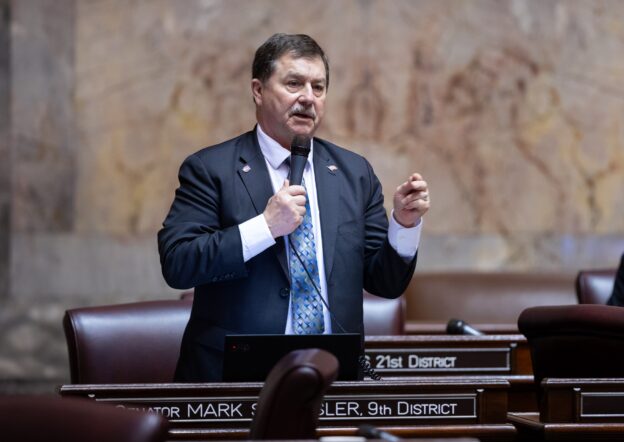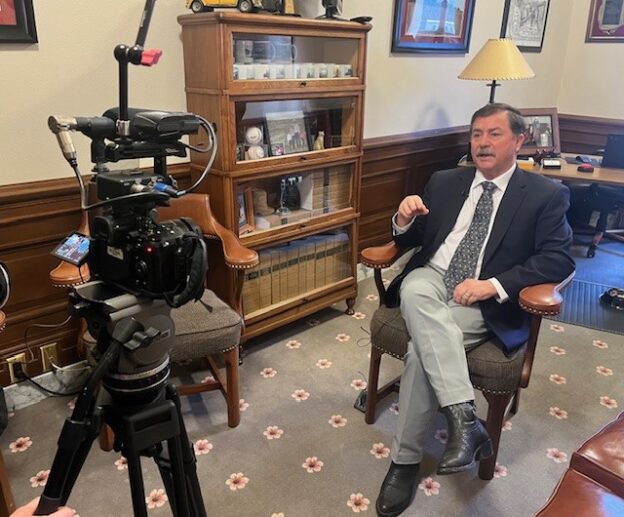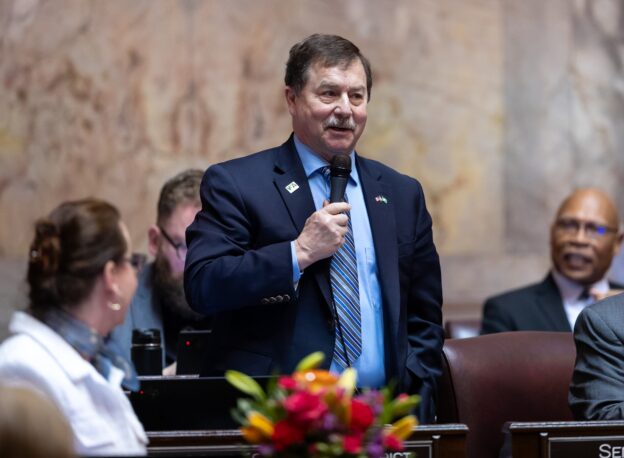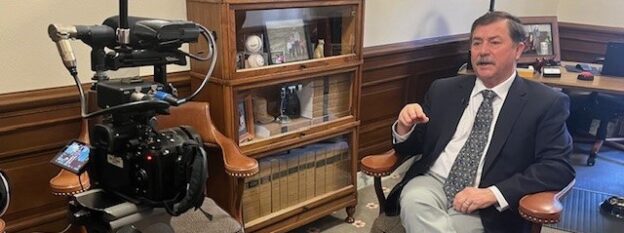Author Archives: brianzylstra
State Sen. Mark Schoesler, R-Ritzville, and other Senate Republicans voted against a bill introduced by Senate Democrats that would eliminate important rights from the parental-rights law approved by the Legislature last year.
Senate Bill 5181 was passed today along party lines, 30-19.
“This bill is a slap in the face of the 454,000 Washingtonians who signed the petition sheets allowing the parental rights initiative to be sent to the Legislature last year,” said Schoesler, who serves the 9th Legislative District.
“Initiative 2081 was passed unanimously by the Senate a year ago, but now my Democratic counterparts want to take a legislative chisel to it and remove parts of it that parents supported most. At a time when parents’ trust in Washington’s public-school system is lower than ever, we should not pass a bill that weakens the parental-rights initiative. But that’s what the Senate majority did today.”
SB 5181 would end or hinder parents’ access to important school-related medical information, including:
- Prior notification when medical services are offered (except in emergencies).
- Notification when medical services or medication could impact health insurance.
- Notification when school-arranged medical treatment results in follow-up care.
It also contains an “emergency clause” that would eliminate the constitutional right of voters to challenge the bill through a referendum. Democrats rejected a Republican amendment to remove the language from the bill.
“There’s no emergency here, so including an emergency clause has no purpose other than to prevent citizens from pushing back through the referendum process. If Democrats are afraid to find out what the voters think of the changes this bill makes, they should have left the law alone.”
SB 5181 now goes to the House of Representatives for further consideration.
Sen. Mark Schoesler will return to the Senate committee that addresses agricultural issues when the Legislature’s 2025 session begins next month.
The 9th District senator today learned he has been appointed to the Senate Agriculture and Natural Resources Committee.
Schoesler, a fifth-generation farmer who grows wheat, barley and fall peas and raises cattle, is pleased about coming back to the ag panel. For many years, his Senate leadership responsibilities prevented him from serving on that committee. Schoesler stepped down as Senate Republican leader in November 2020 after eight years.
“In addition to being a longtime farmer, I represent and serve a district that relies on agriculture,” said Schoesler, R-Ritzville. “Ag remains an important part of our region’s economy. I understand the challenges that farmers and ranchers face. I look forward to again offering an ag-friendly voice on this committee when session starts.”
Schoesler will continue his long streak of serving on the Senate Ways and Means Committee when the Legislature convenes Jan. 13 for 105 days. The 2025 session will mark the 21st straight year Schoesler has been a member of the budget-writing Ways and Means Committee since joining the Senate in 2005.
“I take great pride and responsibility in serving on the Ways and Means Committee and I’m pleased to continue doing so,” said Schoesler. “Tax and spending issues have always been among my highest priorities as a legislator. As a Ways and Means member, I watch out for families and businesses in my district and our state by working to keep taxes and spending in check.”
Schoesler will again be the Ways and Means Committee’s lead Republican on the capital budget, which helps fund construction projects for state government buildings, state parks and colleges and universities.
“In this role, I work with my fellow Republicans and lead Democrats on the committee to produce a list of worthwhile projects to include in the state capital budget for the next two years, including those impacting local school districts and higher education institutions like WSU and Eastern,” said Schoesler, whose district includes the Pullman-based Washington State University and Eastern Washington University in Cheney.
Schoesler also will continue serving on the recently renamed Senate Labor and Commerce Committee. He says he will continue advocating for regulatory reform and other issues that will benefit Washington’s job creators and working families.
“My years of experience in the business of farming have helped me understand regulatory issues, which along with workers’ compensation and unemployment insurance are among the key topics this committee addresses. I know how overzealous regulations imposed by government agencies can be as hard on employers as taxes,” said Schoesler.
Schoesler said the Labor and Commerce Committee should focus on shrinking and simplifying Washington’s vast, complex regulatory system.
“Washington’s regulatory code has over 196,000 separate regulations, which is more than all but five states have. That should tell you there is serious need for reform – and this committee is the place to start,” added Schoesler.
Schoesler represents the 9th Legislative District, which covers all or part of Adams, Asotin, Franklin, Garfield, Spokane and Whitman counties.
State Sen. Mark Schoesler applauded the final version of the state supplemental capital budget unanimously approved by the Legislature March 6, just before lawmakers adjourned for the year.
“While this compromise version of the supplemental capital budget is not as strong in some areas as the version developed and approved by the Senate earlier in the session, it is still a good capital budget that will help communities across Washington, and address many important needs,” said Schoesler, who is the lead Republican capital budget writer in the Senate.
As was the case with the Senate version, the final capital budget funds many projects located in the 9th District, noted Schoesler, R-Ritzville.
Several 9th District school districts receive funding through the small district and tribal compact schools modernization program, including $5.245 million for a school repair project in the Asotin-Anatone School District. Other school districts receiving funding include Creston, Freeman, LaCrosse, Palouse, Pomeroy, Steptoe and Wilbur.
Washington State University’s main campus in Pullman receives $10 million for a new digester at the Knott Dairy Center, maker of Cougar Gold cheese, and $3 million for its campus energy program.
Eastern Washington University in Cheney receives nearly $10 million for energy improvements to its sports and recreation center.
Other local projects in the 9th District that are funded by the supplemental capital budget include:
- Tristate Health Hospital in Clarkston ($1 million).
- Tekoa Parks and Recreation ($200,000)
- Davenport Senior Center capital improvements ($120,000)
- Latah water system rehabilitation project ($187,000)
- Regional Theatre of the Palouse (Pullman) preservation and maintenance ($77,000)
There also is $250,000 for a portion of the Odessa Pipeline project located in the 9th District.
The final capital budget funds several projects that are located near the 9th District:
- $46 million for the Tri-Tech Skills Center in Kennewick.
- $5.5 million for the Odessa Ground Water Replacement Program.
- $3.5 million in toxic cleanup funding for homes affected by the Grays Road and Oregon wildfires in Spokane County last August, plus another $975,000 for the Spokane Conservation District to implement wildfire recovery efforts.
“The Odessa ground water project and the wildfire recovery projects were initiated in the Senate this year and the Senate insisted that these projects stay in the final capital budget. I’m pleased that we succeeded in keeping these projects in the budget,” said Schoesler.
The 2024 legislative session ended March 7.
















